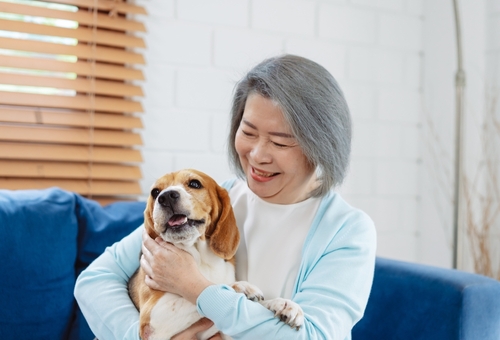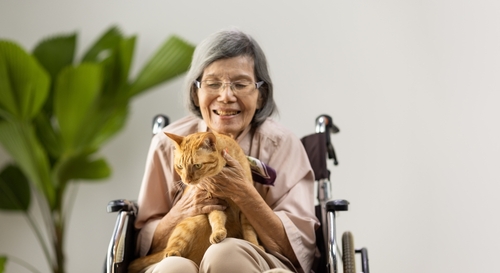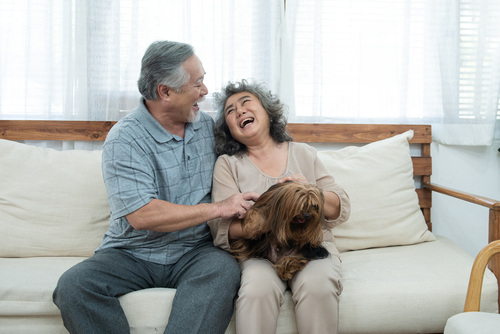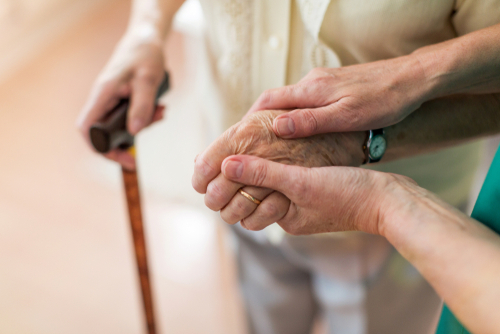
Physical Therapy at Home: Tailored Exercises for the Elderly
December 28, 2023
Mental Health Awareness for the Elderly
March 12, 2024The Benefits of Pet Therapy for the Elderly

The Benefits of Pet Therapy for the Elderly
The Benefits of Pet Therapy for the Elderly. Pet therapy, also known as animal-assisted therapy, has gained recognition for its significant benefits to the elderly.
This holistic approach to care provides comfort, companionship, and a unique form of support that addresses various aspects of well-being.
In this article, we explore the multifaceted benefits of pet therapy for the elderly, highlighting its impact on emotional, physical, cognitive, and social health.
Table of Contents
Understanding Pet Therapy
Pet therapy involves interactions between a person and a trained animal under the guidance of the animal’s handler.
Types of pet therapy include therapeutic visitations, animal-assisted therapy, and resident animal programs, each serving different purposes in elderly care.
Animals, particularly dogs, cats, and even birds, serve as non-judgmental companions with an innate ability to provide comfort and reduce stress among the elderly.
Psychological Benefits of Pet Therapy

Enhancing Emotional Well-being
Regular interaction with pets can alleviate feelings of loneliness and depression by providing companionship and unconditional love.
Stress Reduction
The simple act of petting an animal has been shown to lower cortisol levels and increase the production of serotonin, leading to reduced stress and an improved mood.
Boosting Self-Esteem and Providing Emotional Support
Pets offer a non-threatening presence that boosts self-esteem and confidence, particularly in elderly individuals who may feel marginalized or less capable.
Physical Health Benefits
Encouraging Physical Activity through Pet Interaction
Walking a dog or engaging in playful activities with a pet can encourage physical movement, promoting better overall health.
The Impact of Pet Therapy on Blood Pressure and Heart Rate
Studies have shown that interactions with pets can lead to lower blood pressure and heart rate, contributing to cardiovascular health.
Stimulating Motor Skills and Physical Rehabilitation
Pet therapy can aid in the rehabilitation process, encouraging the use of motor skills through the act of caring for and interacting with the animal.
Cognitive Benefits

Memory Enhancement and Cognitive Stimulation
Engaging with pets can stimulate memories and cognitive function in the elderly, providing a gentle and enjoyable way to maintain mental agility.
Providing a Sense of Purpose and Routine
Caring for a pet provides a sense of responsibility and routine, important factors in maintaining cognitive health and daily structure.
Social Benefits
Fostering Social Interaction and Community Building
Pet therapy often leads to increased social interaction, as pets naturally bring people together, fostering a sense of community and belonging.
Reducing Feelings of Isolation through Pet-Related Activities
Pets can act as social catalysts, reducing feelings of isolation by encouraging connections with others through shared activities and interests.
Choosing the Right Type of Pet Therapy

Selecting the right type of pet therapy involves considering the individual’s health status, preferences, and lifestyle to ensure a beneficial and enjoyable experience.
Not all pets suit every environment or individual. Matching the right therapy animal to the person’s needs is crucial for the success of the therapy.
Implementing Pet Therapy Programs
Successful implementation involves careful planning, considering the preferences of the elderly, and ensuring the animals are well-trained and suited for therapeutic interactions.
Ensuring the health and safety of both the elderly and the animals is paramount, with strict hygiene protocols and appropriate behavioral guidelines for therapy animals.
Overcoming Challenges and Concerns
Managing allergies and overcoming fears are essential steps in making pet therapy accessible to more elderly individuals.
Ensuring the welfare of therapy animals and managing their care requires commitment and resources, emphasizing the need for comprehensive program planning.
Expanding Access to Pet Therapy
Community-driven initiatives and volunteer programs play a crucial role in bringing pet therapy to a wider audience of elderly individuals.
Advocacy efforts can help integrate pet therapy into standard care practices in residential facilities, enhancing the well-being of all residents.
Frequently Asked Questions

What types of animals are typically used in pet therapy?
Dogs, cats, birds, and even horses are common in pet therapy programs, chosen for their temperament and ability to interact positively with elderly individuals.
How often should pet therapy sessions occur for benefits to be seen?
The frequency can vary, but regular sessions, whether daily or weekly, tend to offer the most noticeable benefits in terms of emotional and physical well-being.
Are there any risks involved with pet therapy for the elderly?
While benefits are significant, risks such as allergies, fear of animals, or potential injuries must be managed through careful planning and supervision.
Can pet therapy be beneficial for elderly individuals with dementia?
Yes, pet therapy has shown positive effects on individuals with dementia, including reducing agitation and enhancing social interaction.
How can family members support the introduction of pet therapy?
Family members can support by facilitating access to pet therapy programs, accompanying their loved ones to sessions, and observing interactions to ensure a positive experience.
The Benefits of Pet Therapy for the Elderly – Conclusion

The multifaceted benefits of pet therapy for the elderly encompass emotional, physical, cognitive, and social well-being, making it a valuable complementary approach to traditional care strategies.
By incorporating pet therapy into elderly care, we can provide a more holistic and compassionate form of support that recognizes the profound connection between humans and animals.
Encouraging exploration and implementation of pet therapy programs can significantly enhance the quality of life for elderly individuals, underscoring the importance of this therapeutic intervention in modern care practices.
Are you looking for professional and reliable elderly home care services in Singapore? Contact us today!



